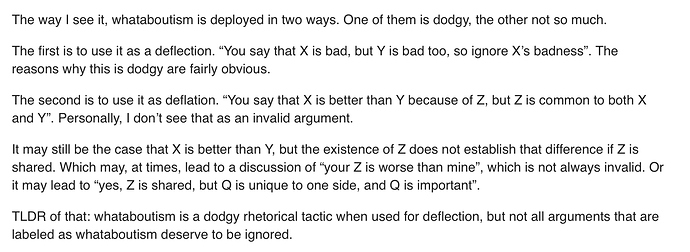I’m in
Nice bit of whataboutism there.
I think of it more as providing relevant context.
No, the original point was that revolutions lead to purges and Terrors, so we should be wary of them.
The second point was what about all these people who were killed by the state. This doesn’t refute the first point, or provide any context about why revolutions descend into purges and Terrors. It’s just’you can’t complain about That Thing because what about This Other Thing that is worse’. Straight-up whataboutism.
To quote what I posted at BB last year:
To me, the first of those tweets carried the implication of “status quo is better than revolution, because revolutions can be bloody”. To me, the observation that the status quo is also bloody (and often to a much greater degree) is a valid rebuttal of that argument.
I posted those links for a few reasons:
-
I was surprised by the Twain quote; I knew he was an anti-imperialist, but I didn’t know that he was that radical. I thought folks might find that interesting.
-
It’s an easily observable thing that historical events labelled as “the Terror” or similar tend to be based around the persecution of relatively small numbers of rich people. This goes back at least as far as the Emperor Tiberius. Meanwhile, the constant slaughter of the peasantry tends to be treated as irrelevant background noise.
-
This sort of one-sided condemnation is also routinely deployed to discredit liberation movements in the global south. A hyper-focus on Castro’s failings paired with silence about the crimes of Batista and the CIA, for example.
-
It also ties into this sort of thing:
Related to this is a factor that comes up both here and on BB: how to judge the ethics of revolutions?
Approach A: did the revolutionaries do bad things, or did the revolution cause bad things to happen?
Approach B: if the revolution caused bad things to happen, are those things better or worse than what would have happened without the revolution?
I’m obviously in the “Approach B” camp.
Revolution is dangerous, even if peaceful. Violence is dangerous, even if justified. But when reading history and politics, we need to “imagine it complexly”, as John Green likes to say. Context is crucial.
IMO, anyway.
Especially with the Russian revolution, you can’t really understand or properly judge it unless you understand the context that it came from. Stalin, shitty as he was, was still not as bad as the Tsars. Imperial Russia was monstrous.
—
However, once more: I am not calling for violent revolution in the USA. But that is because it wouldn’t work, not because it wouldn’t be justified. The oppressed are entitled to pursue justice by any means necessary.
To me, the first of those tweets carried the implication of “status quo is better than revolution, because revolutions can be bloody”. To me, the observation that the status quo is also bloody (and often to a much greater degree) is a valid rebuttal of that argument.
I read it the other way - status quo is also bloody (and often to a much greater degree) so ignore how bloody revolutions can be.
Stalin, shitty as he was, was still not as bad as the Tsars. Imperial Russia was monstrous.
Stalin was not “shitty”, Stalin was (also) a monster. That he was as bad as the Tsars does not excuse his crimes.
From what I’ve read the Bolshevik dictatorship’s executions were more numerous, and their prison camps more extensive, than the autocracy’s. And that goes back to 1918.
And it seems the grain requisitions and the Holodomor killed millions of people.
I don’t have the life expectancy data for a better comparison.

